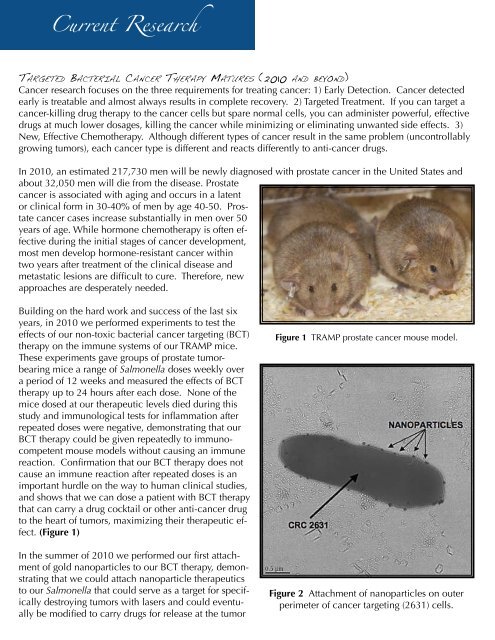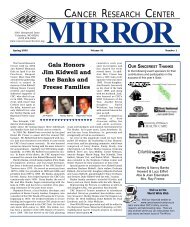2010 Annual Report - Cancer Research Center
2010 Annual Report - Cancer Research Center
2010 Annual Report - Cancer Research Center
You also want an ePaper? Increase the reach of your titles
YUMPU automatically turns print PDFs into web optimized ePapers that Google loves.
Current <strong>Research</strong><br />
TargeTeD Ba c T e r i a l ca n c e r Th e r a p y ma T u r e s (<strong>2010</strong> a n D B e y O n D)<br />
<strong>Cancer</strong> research focuses on the three requirements for treating cancer: 1) Early Detection. <strong>Cancer</strong> detected<br />
early is treatable and almost always results in complete recovery. 2) Targeted Treatment. If you can target a<br />
cancer-killing drug therapy to the cancer cells but spare normal cells, you can administer powerful, effective<br />
drugs at much lower dosages, killing the cancer while minimizing or eliminating unwanted side effects. 3)<br />
New, Effective Chemotherapy. Although different types of cancer result in the same problem (uncontrollably<br />
growing tumors), each cancer type is different and reacts differently to anti-cancer drugs.<br />
In <strong>2010</strong>, an estimated 217,730 men will be newly diagnosed with prostate cancer in the United States and<br />
about 32,050 men will die from the disease. Prostate<br />
cancer is associated with aging and occurs in a latent<br />
or clinical form in 30-40% of men by age 40-50. Prostate<br />
cancer cases increase substantially in men over 50<br />
years of age. While hormone chemotherapy is often effective<br />
during the initial stages of cancer development,<br />
most men develop hormone-resistant cancer within<br />
two years after treatment of the clinical disease and<br />
metastatic lesions are difficult to cure. Therefore, new<br />
approaches are desperately needed.<br />
Building on the hard work and success of the last six<br />
years, in <strong>2010</strong> we performed experiments to test the<br />
effects of our non-toxic bacterial cancer targeting (BCT)<br />
therapy on the immune systems of our TRAMP mice.<br />
These experiments gave groups of prostate tumorbearing<br />
mice a range of Salmonella doses weekly over<br />
a period of 12 weeks and measured the effects of BCT<br />
therapy up to 24 hours after each dose. None of the<br />
mice dosed at our therapeutic levels died during this<br />
study and immunological tests for inflammation after<br />
repeated doses were negative, demonstrating that our<br />
BCT therapy could be given repeatedly to immunocompetent<br />
mouse models without causing an immune<br />
reaction. Confirmation that our BCT therapy does not<br />
cause an immune reaction after repeated doses is an<br />
important hurdle on the way to human clinical studies,<br />
and shows that we can dose a patient with BCT therapy<br />
that can carry a drug cocktail or other anti-cancer drug<br />
to the heart of tumors, maximizing their therapeutic effect.<br />
(Figure 1)<br />
In the summer of <strong>2010</strong> we performed our first attachment<br />
of gold nanoparticles to our BCT therapy, demonstrating<br />
that we could attach nanoparticle therapeutics<br />
to our Salmonella that could serve as a target for specifically<br />
destroying tumors with lasers and could eventually<br />
be modified to carry drugs for release at the tumor<br />
Figure 1 TRAMP prostate cancer mouse model.<br />
Figure 2 Attachment of nanoparticles on outer<br />
perimeter of cancer targeting (2631) cells.



